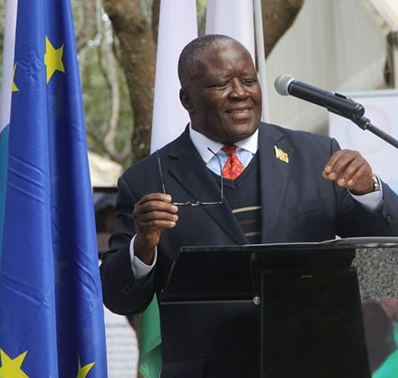|
Getting your Trinity Audio player ready...
|
In his address to the Thirty-third Session of the Commission on Crime Prevention and Criminal Justice (CCPCJ) running in Vienna, Austria from 13 to 17 May 2024, the Permanent Secretary for Home Affairs and Cultural Heritage, Ambassador Raphael Tayerera Faranisi, said Zimbabwe is committed to upholding crime prevention, strengthening criminal justice and promoting the rule of law and international cooperation.
“Zimbabwe recognises the centrality of the Kyoto Declaration, adopted at the 14th UN Congress on Crime Prevention and Criminal Justice, in concretely guiding our actions and efforts towards crime prevention, strengthening criminal justice, and promoting the rule of law and international cooperation. We indeed take note of and are pleased with the preparations for the 15th Crime Congress to be held in 2026, in the United Arab Emirates.
“Chairperson, Zimbabwe is fully committed to the achievement of the Sustainable Development Goals, and with particular reference to the work of this Commission – SDG Goal 16, “Peace, justice and strong institutions”. This obligation is given prominence in the country’s mid-term development blueprint – the National Development Strategy 1 (NDS1) which stresses the importance of enhancing crime prevention and justice delivery to achieve Improved Justice Delivery as one of the key result areas. Several initiatives are being implemented in Zimbabwe to further these imperatives. Given its unique position to support the achievement of SDG 16 through assistance in such areas as reducing violence, ending abuse, countering trafficking in persons and wildlife, addressing illicit financial and arms flows, and preventing and countering corruption, Zimbabwe counts on the support of the UNODC through the appropriate technical cooperation programmes,” Ambassador Faranisi said.
He said the country’s first area of intervention has been to close gaps and loopholes within the national legislative framework for crime prevention and justice delivery and to date, several Acts have been reviewed while new policies have been put in place.
The senior government official alluded to the new Prisons and Correctional Services Act that came into effect in August 2023 and revealed that it is more aligned toward the reintegration of inmates as opposed to incarceration. Through this Act, prisons are now more of a correctional and rehabilitation service to inmates rather than a place of punishment. This measure has gone a long way in reducing crime rates through preventing re-offending.
In March 2022, Zimbabwe enacted the Cyber and Data Protection Act to deal with challenges arising from the digital revolution, especially the rise in cybercrime. A lot of work, however, still needs to be done to adapt to new developments given the dynamic nature of the digital economy and the corresponding evolution of crimes therefrom.
Additionally, a fully-fledged forensics and cyber laboratory was established to improve and speed up evidence processing. The Cyber Laboratory established a monitoring centre for open-source intelligence, malware analysis, big data analytics, artificial intelligence, and facial recognition, while the Forensics Department has enhanced the timeous availability of scientific evidence needed for efficient justice delivery. This has gone a long way in necessitating the clearance of backlogs in some sections, such as those dealing with the illicit drug problem.
Ambassador Faranisi said Zimbabwe welcomes UNODC’s Global programme on Preventing and Countering Terrorism (2022-2027) and undertakes to play its part domestically, regionally and internationally in preventing and countering the terrorism scourge.
“We are also alive to the challenge of illicit drugs, and the increasing links between drug trafficking, corruption and other forms of organised crime, including trafficking in persons, trafficking in firearms, cybercrime, money laundering and terrorism and its financing. We therefore stress on the need to continue fighting corruption, promoting good governance, transparency and accountability, and we will, on our part, ensure that acts of corruption are fully, independently and impartially investigated, with those responsible being brought to justice.
“While several steps and measures have been implemented towards crime prevention and justice delivery in Zimbabwe, challenges remain in meeting SDG 16. With the rise in transnational organised crime in all its dimensions and the need for joint efforts in confronting it, we call for increased collaboration and international cooperation to enhance crime prevention, strengthen criminal justice and promote the rule of law in a manner that leaves no one behind,” Ambassador Faranisi added..






